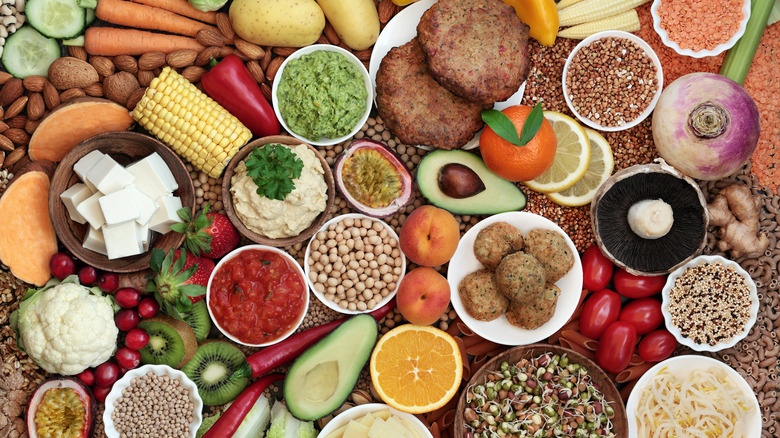How To Gain Weight The Healthy Way
Excess body weight is a risk factor for heart disease, diabetes, and even cancer, but being underweight poses health risks, too. As it turns out, underweight adults have nearly double the risk of premature death than those of normal weight, reports a 2014 study published in the Journal of Epidemiology and Community Health (via ResearchGate). On top of that, they are more likely to develop cardiovascular problems compared to normal-size individuals, according to 2017 research featured in the journal Medicine.
Scientists explain that both obesity and being underweight can take a toll on your health. In either case, the risk of stroke, heart attacks, and ischemic chest pain, or angina, is higher compared to that of the general population. Moreover, underweight women may have difficulty getting pregnant, and some will go through early menopause. In the long run, being underweight may also increase the risk of osteoporosis, depression, anemia, and nutrient deficiencies, warns the Office on Women's Health.
On the positive side, there are steps you can take to gain weight the healthy way. For starters, be prepared to tweak your diet and workout routine. Small changes, such as filling up on nutrient-dense foods and hitting the weight room, can make a world of difference.
If you are struggling with an eating disorder, or know someone who is, help is available. Visit the National Eating Disorders Association website or contact NEDA's Live Helpline at 1-800-931-2237. You can also receive 24/7 Crisis Support via text (send NEDA to 741-741).
Get your calories from whole, nutrient-dense foods
Just because you're trying to gain weight doesn't mean you should eat everything in sight. First, estimate your daily energy intake and then determine how many extra calories you need to reach the desired weight. Use MyFitnessPal, Noom, or other calorie counting apps to track your food intake and optimize the nutrients in your diet. One pound of fat equals about 3,500 calories, according to the Mayo Clinic. Therefore, you'll need an additional 17,500 calories to gain five pounds or 35,000 calories to put on 10 pounds. These numbers are not set in stone, but you can use them as a starting point.
Next, fill up on whole, nutrient-dense foods to boost your daily calorie intake (via Medical News Today). Nuts, pumpkin seeds, sweet potatoes, salmon, peanut butter, quinoa, beans, berries, and greens are all great choices. The same goes for chia seeds, avocado, lentils, and soybeans. These foods are rich in nutrients and relatively high in calories, making it easier to gain weight. Pizza, cookies, and other processed foods are high in calories, too, but they have little nutritional value. Over time, they can put you at risk for high blood pressure, elevated cholesterol levels, obesity, diabetes, and mood disorders, warns the Cleveland Clinic.
Prioritize strength training to gain lean mass
Two people of the same weight can look completely different, depending on their body composition or fat-to-muscle ratio. Chances are, you want to gain lean mass, not fat — and that's where strength training comes in. This form of exercise not only makes it easier to maintain a healthy weight but also increases bone strength, supports brain function, and protects against chronic diseases, notes the Mayo Clinic. Plus, it allows you to build muscle, which may improve your balance and reduce injury risk.
Ideally, prioritize compound exercises, such as the squat, bench press, deadlift, lunges, and rows. These movements hit nearly every muscle in your body, making it easier to build lean mass. "Putting more stress on the body has been shown to create higher hormonal responses, which leads to more muscle growth, strength, and conditioning," specialist Noam Tamir told SELF. Bicep curls, triceps dips, and other isolation exercises, by comparison, hit a single muscle group at a time. Therefore, they're best for increasing muscle definition rather than building mass.
Compound exercises burn massive calories, but you can still gain weight due to the increase in lean mass. Note that hypertrophy, or muscle growth, requires an energy surplus, meaning that you must take in more calories than you burn, explains the National Academy of Sports Medicine. As a rule of thumb, aim for 1.6 to 2.2 grams of protein per kilogram of body weight per day and plan your meals around your workouts.


